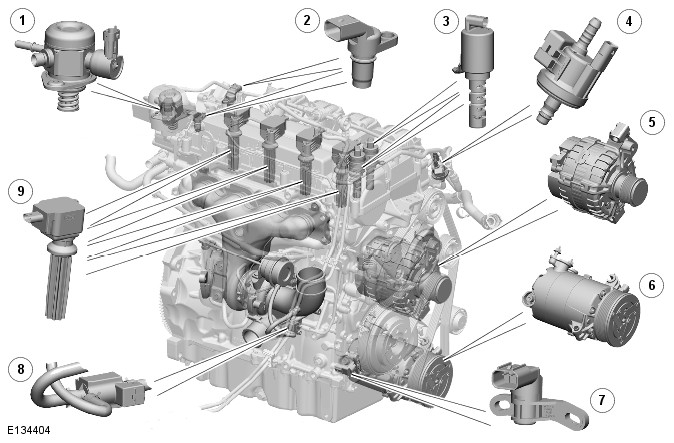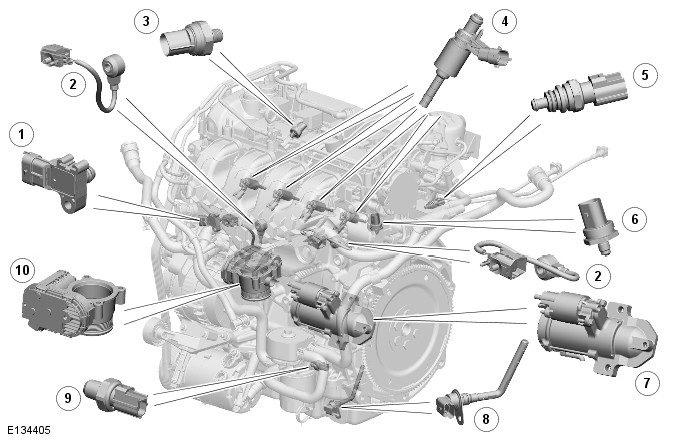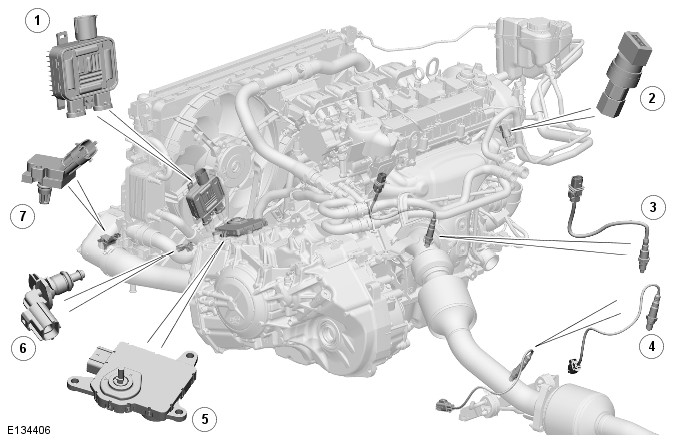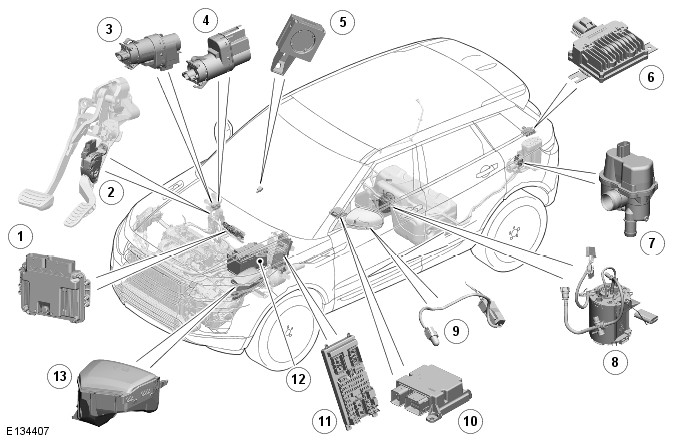Range Rover Evoque: Electronic Engine Controls - Component Location
Component Location
COMPONENT LOCATION - SHEET 1 OF 4

- Fuel metering valve - HP Fuel pump
- Camshaft Position (CMP) sensor (2 off)
- Variable Camshaft Timing (VCT) solenoid (2 off)
- Purge valve
- Generator
- Air Conditioning (A/C) compressor clutch
- Crankshaft Position (CKP) sensor
- Turbocharger wastegate control solenoid valve
- Ignition coil (4 off)
COMPONENT LOCATION - SHEET 2 OF 4

- Manifold Absolute Pressure (MAP) sensor
- Knock sensor (2 off)
- Low Pressure (LP) fuel sensor
- Fuel injector (4 off)
- Engine Coolant Temperature (ECT) sensor 1
- Fuel rail pressure sensor
- Starter motor
- Oil temperature sensor
- Oil pressure sensor
- Electric throttle
COMPONENT LOCATION - SHEET 3 OF 4

- Cooling fan control module
- Air Conditioning (A/C) pressure sensor
- Pre-catalyst Heated Oxygen Sensor (HO2S)
- Post catalyst HO2S
- Transmission Control Module (TCM)
- Engine Coolant Temperature (ECT) sensor 2 (NAS only)
- Turbocharger boost pressure and temperature sensor
COMPONENT LOCATION - SHEET 4 OF 4

- Engine Control module (ECM)
- Accelerator Pedal Position (APP) sensor
- Stop lamp switch
- Stop lamp diagnostic switch
- Immobilizer Antenna Unit (IAU)
- Fuel Pump Driver Module (FPDM)
- Diagnostic Monitoring Tank Leakage (DMTL) pump
- Fuel pump module
- Ambient temperature sensor
- Restraints Control Module (RCM)
- Central Junction Box (CJB)
- Battery
- Battery Junction Box (BJB)
Electronic Engine Controls - Overview
OVERVIEW
The 2.0L Gasoline Turbocharged Direct Injection (GTDi) engine is an in-line, double overhead camshaft, 4 cylinder engine, which is transverse mounted in the engine compartment. The engine management system is controlled by an ECM (engine control module) located in the engine compartment. The ECM uses inputs from various sensors to control actuators to achieve optimum conditions of all aspects of engine running, emissions and performance.
The engine uses a returnless, high pressure direct injection fuel system, with 7 hole injectors to supply the cylinders. An in tank, low pressure pump delivers fuel to an engine mounted high pressure pump, driven from the exhaust camshaft. Both pumps are controlled by the ECM.
The Borg-Warner K03 turbocharger is located on the exhaust manifold and features a pressure controlled, solenoid operated wastegate and water cooled bearing housing.
The double overhead camshafts use VCT (variable camshaft timing) which allows the timing of the intake and exhaust valves to be adjusted independently of each other. The system is operated by 2 VCT solenoids which are controlled by the ECM using information from 2 CMP (camshaft position) sensors.

